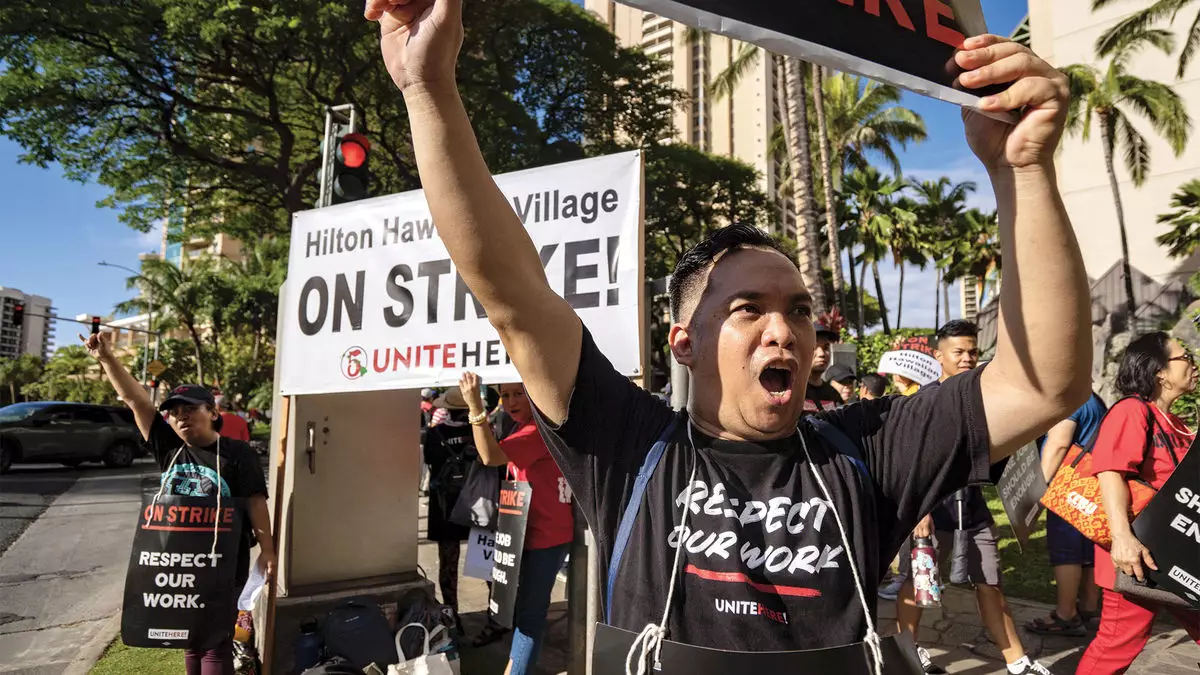In a significant display of unity and resolve, approximately 10,000 hotel workers walked off the job during the Labor Day weekend across nine key cities in the United States. Their temporary strike has brought to the forefront pressing concerns about wages, staffing, and service quality within the hospitality industry. These workers have since returned to their roles as of September 4, but the underlying tensions hint at the potential for further strikes if ongoing contractual negotiations fail to yield satisfactory results. Industry insiders suggest that a resolution may not be achievable in the short term, indicating a prolonged struggle ahead.
Organized by Unite Here, a prominent labor union representing hospitality workers, these strikes impacted a total of 25 properties from major hotel chains, including Hilton, Hyatt, and Marriott International. Cities affected included noteworthy metropolitan areas like Baltimore, Boston, and several locations in California and Hawaii. The duration of each strike ranged from one to three days, marking this series of labor actions as the most extensive initiated by Unite Here to date.
The catalyst for the walkouts lay in unresolved contract discussions, where hotel employees demanded a hike in wages, better staffing ratios, and the reinstatement of services that had been cut following the COVID-19 pandemic. The cuts have had considerable consequences, leading to job losses and heavier workloads for those who remain—a situation that the union has highlighted as untenable.
Gwen Mills, the international president of Unite Here, articulated the workers’ plight, emphasizing the differences between the hospitality industry’s booming profits and the struggles facing frontline employees. “The hotel industry is making record profits while workers and guests are left behind,” she declared, further emphasizing that many workers are unable to afford living in the cities where they provide service. High living costs, combined with stagnant wages, create an unsustainable environment for many hospitality workers trying to support their families.
This sentiment is echoed by labor experts who have observed the effects of service cuts on hotel operations. David Sherwyn, from the Cornell Center for Innovative Hospitality Labor and Employment Relations, pointed out how changes in industry practices have negatively influenced both employment and service quality. The reduction of staff in essential areas, influenced by technological advancements and shifts in consumer behavior—such as the rise of delivery services—has meant fewer job opportunities for workers, while the remaining staff are burdened with increased responsibilities.
One area of contention that has emerged in negotiations is daily housekeeping service. Many hotels had altered their policies, opting for electronic check-in and reducing the frequency of room cleaning. Sherwyn notes that labor negotiations have begun to see positive developments regarding this issue, with unions winning back automatic daily housekeeping in many full-service hotels. However, the ongoing negotiations may be focused on how this policy is communicated to guests, illustrating the nuance involved in what seems like a straightforward demand.
In response to the strikes, management representatives from major hotel chains have sought to present a united front. Hyatt’s head of labor relations emphasized the company’s intent to engage in constructive negotiations, claiming they have offered competitive wages and benefits packages. Hilton has also reiterated its commitment to fostering a collaborative relationship with union representatives. Nevertheless, the key question remains whether such offers will suffice to alleviate worker discontent, given the clear disconnect between company profits and employee compensation.
Looking ahead, the coming weeks are poised to be crucial in determining whether the disputes can be resolved or whether they will lead to sustained labor unrest. Past experiences indicate that ongoing strikes without resolution can lead to extended periods of conflict, as seen in previous negotiations in Southern California, where labor actions ultimately succeeded in yielding substantial wage increases for Unite Here members.
The reception of these strikes by the public and the impact of consumer sentiment will play a decisive role in shaping the future of these negotiations. Unlike the auto industry, which saw the United Auto Workers gain significant public support, the hotel industry’s inherently customer-facing nature presents unique challenges. While public sympathy could embolden the strikers, the potential for backlash from customers weary of labor disruptions cannot be overlooked.
As these negotiations unfold, it is clear that workers are advocating not only for their livelihoods, but also for a more equitable and sustainable future within an industry that is critical to the economy yet often neglects its essential workforce.


Leave a Reply